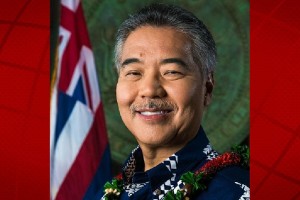Governor Ige Extends Emergency Period on Mosquito-Borne Illnesses

Governor David Ige. State of Hawai’i Governor’s Office photo.
Governor David Ige has signed a supplemental proclamation to extend the state’s emergency period for combating mosquito-borne illnesses.
The proclamation, signed Monday afternoon, extends the emergency period for another 60 days. Governor Ige declared a state of emergency on Feb. 12, four days after Big Island Mayor Billy Kenoi issued an emergency declaration in the face of the dengue fever outbreak.
Signing the emergency proclamation gives the state access to the Major Disaster Fund and allows the option to waive certain laws and regulations related to outbreak response, if needed. It also permits coordination with other states and territories for mutual aid from the Emergency Management Assistance Compact, and opens the door for federal funding help if the state runs out of resources.
“We are grateful to Governor Ige for taking proactive measures to ensure that our counterparts in the counties and at the Department of Health are able to utilize the resources they need to prevent another outbreak of mosquito borne diseases in Hawai’i,” said Vern Miyagi, Administrator of Emergency Management. “It is critical that we all do our part, both residents and visitors, to take personal precautions to prevent mosquito bites and the spread of these illnesses.”
The initial emergency declaration allowed the state to release a five percent budget restriction on the DOH, freeing up $250,000, allowing the department to fill eight vector control positions and hire an entomologist and a communications specialist. A similar budget restriction was waved before Ige’s emergency declaration.
According to the Department of Defense, six of the eight vector control hires have already started, and the other two are expected to join them “very soon.” Additionally, the state has re-stocked DOH and its vector control teams with proper equipment.
“We have continued to assess and monitor mosquito activity on Hawai’i Island since the dengue outbreak is not over yet,” said Health Director Dr. Virginia Pressler. “We have also been responding to multiple imported cases of dengue fever, Zika, and chikungunya across the state. Each time a travel-related case is discovered, we take steps to investigate the case and ensure that they understand proper precautions to take during the infectious period to prevent the disease from spreading.”
DOH says it will be launching a statewide public education campaign later this year, spearheaded by its Communication office, to educate residents on preventing mosquito-borne illnesses and diseases.
During the extended emergency period, the DOH and Hawai’i Emergency Management Agency plan to continue coordination with its partners at the county level to develop a comprehensive response plan that will spell out actions and measures based on the state’s current mosquito risk.
Sponsored Content
Comments








